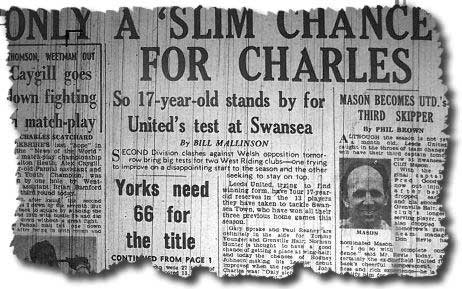 Part
1 - Return of the king
Part
1 - Return of the king
As the 1962/63 season entered September, Leeds United were in a sorry
state.
They had broken their transfer record in the summer to sign former star
John Charles, but the Welshman had
struggled to recover his former glories and the team was not living up
to pre-season hopes.
Manager Don Revie was in despair
at the mediocrity of his team's performances. After a dismal defeat at
home to Bury, he took radical action for the trip to Swansea on 8 September,
dropping both Tommy Younger and Grenville Hair, and making Cliff Mason
his third different captain of the season. What was even more drastic,
however, was the way he chose to remodel his team, drafting in four teenagers
- goalkeeper Gary Sprake, right-back Paul Reaney, left-half Norman Hunter
and centre-forward Rodney Johnson,
who deputised for Charles, not fit to play. Sprake had made his debut
the previous season, but the others' only experience was in the reserves.
Revie had intended to bring United's promising youngsters through gradually
but now he decided enough was enough. Desperate times call for desperate
measures and the manager decided that the time was right to give youth
its head.
The experiment could have gone disastrously wrong and left Revie with
egg on his face, but Johnson scored on his debut and Billy Bremner added
a second to earn a startling victory. It was as much the grit and style
of the performance as the result, however, which was of import, for the
new team looked as good as Leeds United had for an age. In particular,
according to the Yorkshire Post, 'Bremner and Collins provided
the best display of inside forward work that United have had for years.
United moved faster and played more accurately than at any time this season,
or last, the youngsters bringing a zip the side has badly needed.'
Charles was back for the next match, at Elland Road against a Chelsea
side that was pressing for promotion back to the First Division after
being relegated the previous season. Johnson sustained a knock at Swansea,
and was left out to allow the Welshman to return. Don Revie consoled him
with the words 'He did a good job at Swansea and he has plenty of time
ahead of him.'
Sprake, Reaney and Hunter retained their places, but it remained a gamble
for Revie to rely on such unproven talent against one of the most powerful
sides in the division. Chelsea had dropped just three points from their
first seven matches.
Under their formidable young manager Tommy Docherty, Chelsea were on
the way to becoming one of the country's best teams in the mid-60's. Terry
Venables, Peter Bonetti, Ron Harris, Eddie McCreadie, Barry Bridges and
Bobby Tambling were among the youthful stars who had made the Londoners
promotion favourites.
However, on the back of the Swansea triumph and with Charles restored
after losing 9lb in a fortnight, Leeds United had new confidence and looked
forward to the game with genuine hope. The fans shared the optimism and
another crowd in excess of 27,000 flooded in to Elland Road.
Unfortunately, their hopes were severely dented with just four minutes
on the clock. Leeds had started well and a Bobby
Collins goal was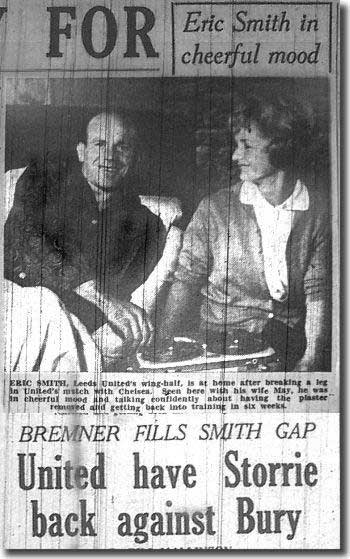 ruled out for offside, but when right-half Eric Smith crashed into a tackle
on Moore he came off worst and had to be stretchered off with a broken
leg. It was a bad injury and Smith only ever played once more for United
before his transfer to Morton in June 1964.
ruled out for offside, but when right-half Eric Smith crashed into a tackle
on Moore he came off worst and had to be stretchered off with a broken
leg. It was a bad injury and Smith only ever played once more for United
before his transfer to Morton in June 1964.
In those days, substitutes were still not allowed and playing a man short
set Leeds back on their heels. Billy Bremner was forced to reinforce the
defence, reducing the attack's effectiveness. However, Chelsea over elaborated
in their approach work, playing into United's hands. The Yorkshire
Evening Post's Phil Brown wrote, 'Chelsea were too studied and deliberate
in their attack, lost a shooting chance by "after you" passing
and Tambling hit the defensive wall with a free kick just outside the
penalty box. They were not at all impressive against 10 men and Bridges
shot over the bar from nine yards after Venables had reached him with
a pass through a ruck.'
The Stamford Bridge side would have been better advised to stretch their
opponents by pulling them wide and upping the pace of the game, but they
allowed Leeds to get a foothold in a scrappy game, with Albert
Johanneson a constant outlet on the left. It looked like a stalemate
as the interval drew near but with two minutes to go, Johanneson opened
the scoring with a superb effort. Charles and Noel Peyton made the opening
on the left and the South African evaded three tacklers with a shimmy
and cut in to clip the ball past Bonetti in the Chelsea goal.
back to top
The Londoners fared no better after the break and struggled to exert
any control. Johanneson netted a second to make the game safe two minutes
from time, seizing on Bremner's free kick into the area to leave Bonetti
helpless again.
The loss of Smith generated the same backs to the wall spirit which had
carried Leeds through at Swansea and the spirit which flooded through
the team brought new hope to Elland Road.
Unfortunately, however, the improvement couldn't be sustained - the next
six League matches brought only three draws and three defeats. Charles
continued to struggle to find any kind of form, and newspapers hinted
at a transfer back to Italy.
Juventus' local rivals Torino came in with a bid, but soon it became
clear that Roma were favourites to secure the Welshman's signature. They
were undeterred by Charles' lack of form, as he toiled without success
against the defences of Second Division sides. He played one tremendous
game, away to Southampton at the end of September, when he was forced
to drop back to centre half to replace Jack Charlton after the defender
was injured, forced to see out the game on the wing.
Charles was outstanding in his old defensive position, as Norman Hunter
recalls: 'Southampton had this striker called George Kirby and he had
already sorted Jack Charlton out.
He was giving all of us a bashing but John came back into defence and
that was the end of Kirby. He was heading the ball away before Kirby had
got off the ground. I was a very young man at the time and I remember
John telling me, "Slow it down." He was telling me what to do
and what not to do. It was a defensive display I'll never forget. I'd
have loved to have played more games with him.'
But good as Charles was as a centre-half, he had been bought to score
goals, and in that respect was a dismal failure. The youngsters, driven
and shaped by the fiery Bobby Collins, had shown Don Revie what could
be achieved without Charles, and the Welshman was keen to return to sunnier
climes, constantly pestering the directors to agree to his transfer request.
In the end, despite strenuous denials, the board finally decided to cut
its losses and call an end to a disastrous gamble.
At first the board had been resolute, stating 'We are not prepared to
release John Charles. There is no question of the matter being reconsidered.'
However, they could not ignore his lack of form for ever.
Throughout a drab goalless draw at Derby on 13 October, Charles was dismally
ineffective, exhibiting an almost habitual tendency to drift far too deep,
leaving Leeds with few attacking options. The Welshman's frustrations
were evident after the game when he commented on his desperation: 'I have
reached the stage now where I can't sleep at nights. This is the first
time my football has left me so long and I feel shattered. It was a mistake
for me to come back.'
Eric Stanger: 'He has not been the old John Charles they knew so well
and admired. He returned badly overweight, and though he has since shed
several pounds in training he has lacked much of his old speed and almost
all his deadly finishing. In 10 Second Division games at centre-forward
he has scored only three goals, the last being at Huddersfield as far
back as September 1. In my opinion Charles has found the speed in tackling
in Second Division football too quick after his years on the Continent.
There the style of play often deliberately permits a player to hold the
ball in midfield while a retreating defence positions itself. In the Second
Division the tackle is made as quickly and as strongly as possible. When
I have seen Charles since his return he has often been tackled in possession
and looked a little surprised that the challenge should have been made
so soon.'
As it turned out, the whole Charles episode brought a healthy £17,000
gain as a deal worth £70,000 was agreed with Roma. At 6.59 pm on Friday,
2 November the formalities were completed, with Charles flying off to
Italy to make his debut that same weekend for his new club against Bologna.
He scored in the game, but he had no dream stay in the Eternal City.
He was back in the Football League within a year, signing for Cardiff
City, who had long coveted his talents.
For Revie and Harry Reynolds the Roma money was hugely welcome, although
the promise of the teenagers meant they could be judicious in spending
it. In the Southampton game when Charles had played so well, the young
Scot Peter Lorimer became Leeds' youngest ever player at just 15 years,
289 days old, while 19-year-old Mike Addy
was playing his fourth first team game, bringing the number of teenagers
in the side up to five.
Dundee-born Lorimer was one of the hottest young properties around after
some prolific success in schoolboy football, with 176 goals in one season
for Stobswell School and decent performances in his games for the Scottish
Schoolboys. Revie had beaten almost 30 other top class clubs to Lorimer's
signature, driving all through the night to Scotland to sign him and receiving
a speeding ticket for his trouble.
Addy had more limited credentials, but the fact that Revie could snap
up virtually any youngster he wanted was testimony to the man's charisma
and sure touch with parents. As Syd Owen recalls, 'There was a lot of
competition for the boys, so we invited the parents to come 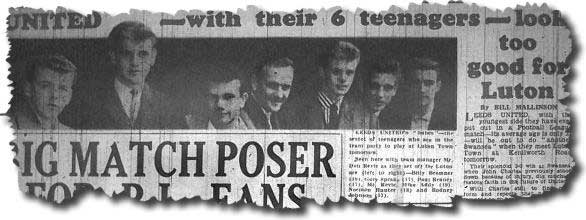 down
to the club as well. We put them up in hotels and let them stay a short
time. We took them to see the people who looked after the boys in digs.
We even had a church minister come down to the ground every Thursday to
walk round the dressing room and ask the young players if they had any
problems.'
down
to the club as well. We put them up in hotels and let them stay a short
time. We took them to see the people who looked after the boys in digs.
We even had a church minister come down to the ground every Thursday to
walk round the dressing room and ask the young players if they had any
problems.'
back to top
In a show of gratitude for the efforts of his young manager, chairman
Harry Reynolds decided to offer visible signs of support, making some
of the Charles money available for Revie to reinforce his squad.
It was impressive testimony to the enormous confidence of the board in
their man because during November the club had announced a record trading
loss of £72,259, with the bank overdraft almost £70,000.
Reynolds had little option, however, as a spate of injuries decimated
Revie's squad, while Tommy Younger returned to Scotland after announcing
his retirement following a recurrence of his old back problems.
£1,500 was paid to St Mirren for young Scottish winger Tommy Henderson
at the beginning of November, while Rotherham's bustling forward Don
Weston signed for £18,000 on 13 December. A couple of weeks earlier
Crewe Alexandra goalkeeper Brian
Williamson had arrived at Elland Road as cover for Gary Sprake.
It was the second time that 19-year-old Henderson had signed for the
Elland Road club. He had first arrived with Billy Bremner in 1959, but
had returned to Scotland shortly afterwards for spells 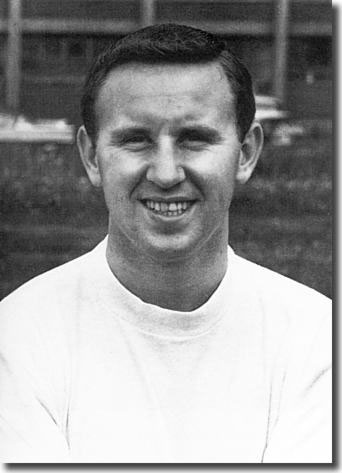 with
Hearts and St Mirren and an appearance in the 1962 Scottish Cup final
for the Saints against Rangers.
with
Hearts and St Mirren and an appearance in the 1962 Scottish Cup final
for the Saints against Rangers.
Weston had earlier that season torn the United defence apart when scoring
twice in Rotherham's exciting 4-3 win at Elland Road. He had proven himself
a dangerous striker with Wrexham and Birmingham and was renowned for his
power and pace. He brought exactly the sort of threat which Don Revie
had vainly hoped that John Charles would deliver and marked his debut
on 15 December with all three goals in a sterling win at Elland Road against
Stoke City, who were handily sitting third in the League.
Leeds' form in the weeks before the game had continued to be patchy,
although a Jim Storrie hat trick
had been the inspiration of a 6-1 win against Plymouth.
Before the game, Stoke had conceded just eight goals in 10 away matches,
but the United attack, with Storrie in fine form, shredded them. It was
Weston, however, who brought the edge, coming close to a fourth goal when
he hit the crossbar late on.
Richard Ulyatt: 'It might have been five goals for Weston instead of
the most spectacular hat trick I have seen a Leeds United player score
at Elland Road in 25 years of intermittent watching. It was an individual
triumph because while Henderson provided the pass for the first goal,
Collins, Storrie and Johanneson the passes for the second and Clamp's
hasty attempted clearance the opportunity for the third, no other player
on Leeds United's books either now or in recent years would have had the
combination of speed, self assurance and accuracy to take all the chances.'
It was a stunning debut and the Storrie-Weston partnership hinted at
better things to come.
However, high-flying Sunderland saw Leeds off 2-1 a week later at Roker
Park, and it was to be weeks before United could recover from the setback
because it was at this point that one of the worst winters on record put
the season on hold for more than two months, leaving the Leeds players
to kick their heels in frustration until 2 March.
Most of the country's grounds, and all those in the North, were rendered
unplayable by the cold weather and all consuming ice. More worrying still
for Leeds was the loss of income from gate receipts throughout the period,
with no corresponding reduction in expenditure. Harry Reynolds, Manny
Cussins and Albert Morris made further loans to the club to tide them
over the winter and increased personal guarantees by the board were required
to secure an increased bank overdraft. It increased the club's debt burden,
but at least gave them the necessary funds to keep them afloat.
Leeds had slumped to 13th place during their lay off as most of their
rivals returned to action in advance of the Elland Road club. However,
the tyrannical training regime of Les Cocker brought the United players
to the peak of fitness during the break and they resumed action in far
better condition than their opponents, announcing their return with an
impressive 3-1 win against Derby County.
Even a shock transfer request from Billy Bremner could not put a dampener
on the Elland Road revival, but it certainly worried Don Revie, who was
a big advocate of Bremner's talent and commented: 'If he goes, I go, because
I want to build a team around him.'
Bremner spoke of his reasons for the move: 'I told the club I wanted
away and that I was not settled in Leeds. I thought it would be different
when I was married but it is not so. The club have been all right to me.
It is a pity this club was not in Scotland. I feel I can improve my chances
of getting a place in the Scotland Under-23 team by moving to Scotland.
I think I shall be happier playing my football up there. I have not been
really satisfied with my form this season.'
Bremner had actually been in and out of the side for some time, suffering
with his form, but Leeds were proving that the team was bigger than any
single player. They had shown they could cope without Charles, and could
do so without Bremner, accepting his request and agreeing to put him on
the transfer list. Tommy Henderson had made the right wing berth his own
with some impressive displays and United were the form side of the spring,
winning game after game and soaring up the table. They continued to have
matches in hand on their rivals, and by the end of April they sat on the
verge of an unlikely promotion.
What was even more exciting, for the fans at least, was that Leeds United
had finally been able to put together something of a decent FA Cup run.
The club had 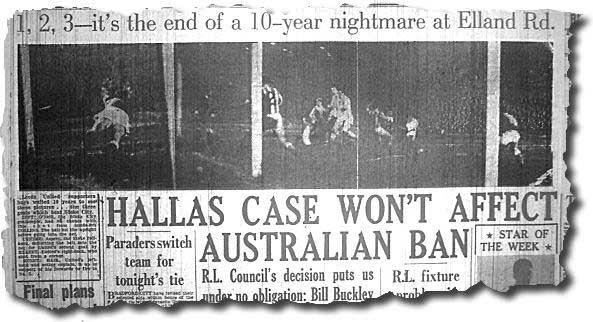 by
far the worst FA Cup record in the country and had not won a tie since
February 1952, when goals by Jim Milburn and Ray Iggleden had seen off
Bradford 2-1 in the fourth round.
by
far the worst FA Cup record in the country and had not won a tie since
February 1952, when goals by Jim Milburn and Ray Iggleden had seen off
Bradford 2-1 in the fourth round.
back to top
Leeds' first match was at home to Stoke City, but because of the weather
the match was postponed twelve times. Rather than the first weekend in
January, the tie actually took place on Wednesday 6 March. It was a titanic
struggle between two sides battling for promotion.
The bog of a pitch had been left ankle deep in cloying mud after the
thaw and Leeds' superior fitness told in the first twenty minutes as they
raced into a 2-0 lead. Bobby Collins was again in great form and opened
the scoring, taking Hunter's square pass to beat goalkeeper O'Neill from
20 yards with a hard low shot which went in off a post. Eric Stanger:
'It was fitting, for Collins strode the battlefield throughout like a
pocket Napoleon, guiding his troops hither and thither with long passes
to either wing or with shrewd lobs over the bogged down Stoke defence.'
Eight minutes later Paul Reaney added the second, coming up to take Tommy
Henderson's short corner and shoot through a packed area.
If Don Revie and his men thought they could coast home they were wrong,
for City began to get to grips with the conditions after that, adopting
a long ball game and pressing Leeds hard. However, Gary Sprake and his
beleaguered defence stood up well to the test, and it was the 70th minute
before Stoke managed to narrow the deficit, Bebbington netting the rebound
after Sprake spilled Ratcliffe's effort.
That prompted a few jitters in the Leeds defence, but acting skipper
Grenville Hair, the only Leeds player who had experienced a win in the
tournament, netted a decisive goal to round off a memorable 3-1 victory.
He uncharacteristically made his way forward in support of his attack
to force a shot between keeper and near post and bring relief to his hard
pressed team mates.
Afterwards he said: 'That was my gladdest moment in football. It's only
the second goal I've scored, and I don't suppose I'll score another one
now but I've had my moment. Stoke were a very good side to beat and I
think we did splendidly to score three on that pitch. I was very proud
to be acting captain last night and I could not have had a better lot
of lads. It was all compensation for those last 10 Cup years. There's
been many a joke about them in the town, but it wasn't fun to be a player
in there, I can tell you.'
Goals by Storrie and Johanneson secured a hard won 2-0 victory
at Middlesbrough in the fourth round. Former United manager Raich
Carter had just taken charge at Boro and was disappointed when his
keeper Emmerson gifted Leeds both goals, but the Teessiders had never
seriously threatened Sprake's goal.
Three days later, Nottingham Forest, a formidable First Division outfit,
outclassed a tiring United side 3-0 at the City Ground. They set out to
'stop Collins and keep Johanneson on the touch line', and those tactics
stymied a one dimensional attack, rendering Storrie and Weston virtual
bystanders. It was a sad end to a heroic Cup run, but Leeds had finally
shown that they could find some success in the competition.
Harry Reynolds nonchalantly predicted that the Cup exit would allow Leeds
to concentrate on promotion, but four days later United struggled at Norwich,
finding themselves trailing 3-0 before half-ime. A rally after the interval
brought them back to 3-2, and they had enough chances to win the game,
but wasted them all to finish with nothing to show for all their efforts.
They had played seven games in just 22 days and were looking jaded. They
enjoyed games in hand, but lay twelfth in the table, eight points off
the promotion places, with seemingly too much ground to make up. It was
now, however, that Leeds discovered their real form and 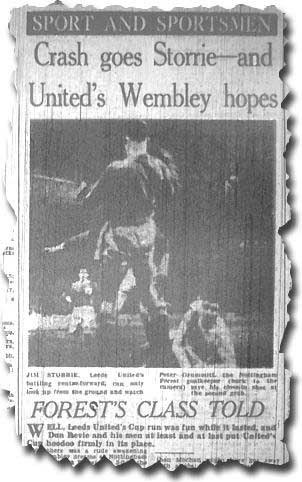 launched
the most unlikely of promotion bids.
launched
the most unlikely of promotion bids.
A week after the Norwich reverse, United hammered a dour Grimsby side
3-0, with Brian Williamson making his debut in goal. Leeds weren't on
their best form, but the goals came at the right time and they were never
seriously threatened. The game was dead at the hour mark with the Yorkshire
club safe with a 2-0 scoreline. Bremner netted the first with a spectacular
20 yard drive and shortly after the break Collins added a second. He completed
the rout in the closing seconds with the best goal of the game, getting
on the end of a passing move which had begun in the Leeds half to finish
with calm assurance.
Bremner got the only goal to secure a lucky 1-0 win at home to Scunthorpe,
but then came a disappointing 3-1 defeat away to a decent Plymouth Argyle
team, for whom McParland netted a hat trick. That again seemed to spell
an end to any hopes of going up, but Leeds fought back. They cruised into
an impressive spell of form, hammering Preston 4-1 before enjoying an
Easter period double over Charlton.
The Charlton games were among the first in which the negative, timewasting
tactics of later years were to be displayed by a Leeds United side under
orders by manager Revie to stifle the opposition and secure the points
after earning a lead.
The crowd 'strongly objected to the way in which they taunted Charlton
in the closing stages by rolling short passes to each other in midfield
or putting the ball back to Sprake'. Don Revie saw nothing wrong with
the tactics: 'It is really just making absolutely sure that you keep possession
by making safe, short passes, and that accordingly you preserve the score
with your team leading. It demands real skill, control and concentration
by the players doing it - you can easily make an expensive mistake if
you slip. But Continental crowds cheer it when successfully done, and
rightly so, in my view.'
back to top
It was an approach which would infuriate critics over the years which
followed as Don Revie honed the style. For the time being, however, Leeds
were only toying with the tactics and had not yet mastered the art of
impregnable defence.
In the next game United inexplicably collapsed 3-0 at Portsmouth, before
wins against Scunthorpe and Cardiff moved them firmly into the promotion
frame. Jim Storrie scored all three goals in the trouncing of the Welsh
side and was proving a tremendous asset, following his switch to centre
forward after the departure of John Charles.
The Scot had not welcomed the move: 'Really, I was an old fashioned inside-forward
carrying the ball through, playing one twos. In Scotland, no one bothered
how you played and I always seemed to be looking for people to play off.
But when I was the target man, I had the goalkeeper behind me. Individually,
I think I became a worse player. My wife Nancy told Revie this at a function
one night, but he just laughed and said, "you may be right but they
are a very successful team." That was true. The success glossed over
a million deficiencies. I adapted because I was caught up in all the enthusiasm.'
Whatever the truth, the trick was working, for the hat trick against Cardiff
took the Scot onto 21 goals for the season.
| |
Top of Second Division - 27 April 1963 |
| |
Pos
|
|
P
|
Pts
|
| |
1st
|
Stoke
City |
36
|
49
|
| |
2nd
|
Chelsea |
38
|
47
|
| |
3rd
|
Sunderland |
37
|
45
|
| |
4th
|
Bury |
38
|
44
|
| |
5th
|
Leeds
United |
36
|
43
|
| |
6th
|
Huddersfield
Town |
36
|
43
|
| |
7th
|
Newcastle
United |
38
|
42
|
| |
8th
|
Plymouth
Argyle |
41
|
42
|
| |
9th
|
Norwich
City |
37
|
41
|
In truth, all the United forwards were doing well, and the attack as
a unit was far more cohesive than it had been for years. The previous
season, Leeds had managed just 50 goals in the League all season. Thus
far, they had already netted an impressive 47 goals in 18 games at home,
an astonishing turnaround. Bremner, Collins and Johanneson were regular
contributors on the score sheet, although Don Weston's initial goal rush
had dried up.
Leeds now faced a major challenge, with a trip to Chelsea, handily placed
at second in the table, and favourites to go up with leaders Stoke City.
They had endured a difficult run following the resumption after the big
freeze, but still boasted some of the best young players in the country.
On the day of the game, Tuesday 30 April, Don Revie was given a major
confidence boost.
The young manager had begun to generate national interest for the impact
he was having at Elland Road. In October he had been forced to dismiss
as 'ridiculous' a report that his name was being mentioned on the Soccer
grapevine as a possible successor to Walter Winterbottom as England's
team manager: 'As far as I am concerned it is ridiculous even to mention
me for the job. I am very happy at Leeds - even with all the ups and downs.
What I want to do is put Leeds back on the soccer map. I have made mistakes
in buying and I may make more, but I am learning. I honestly think no
manager can have a better board of directors. They have backed me and
never interfered once. I'll do everything I can to put this club on the
map. If I fail I'm entitled to the sack.'
It was Ipswich Town manager Alf Ramsey who eventually replaced Winterbottom,
but chairman Harry Reynolds decided to give his man a visible sign of
support, prompting his fellow directors to extend the manager's contract.
In March, the Yorkshire Evening Post's Bill Mallinson wrote, 'Don
Revie has just completed two years as Leeds United's team manager. When
he was appointed, he signed a three year contract, but the question now
is whether United will follow the lead of other clubs who think they have
the right man at the helm and make sure in good time that he stays at
Elland Road. With the help of the board he has set in motion a trend which
this season has brought about the desired revival at Elland Road. But
it is the general spirit prevailing at Elland Road and the store of young
talent which Mr Revie and his staff have got together over the last two
years (often in the face of keen competition from First Division clubs)
which suggest that it is now time for United to be considering ensuring
the continuity of this progress. It is known that last close season a
club in a lower grade of football was prepared to find a bigger salary
for Mr Revie than his present one, but United, of course, with their potentiality
and progressive attitude must surely present a greater appeal for him.'
The board offered him a three year extension on his contract, tying him
to Elland Road until March 1967, in recognition of his achievements thus
far in building an exciting new team. The new contract also made him the
best paid manager outside the top flight, a status which gave Revie the
material reassurance his insecure personality demanded and appealed to
his vanity.
Revie's new contract set the team up nicely for the Chelsea test. It
was a tremendous battle, with honours shared in a 2-2 draw. Chelsea opened
the scoring when Barry Bridges forced the ball home off the post after
Gary Sprake pushed out a 25 yard shot by Moore, but Ian
Lawson's hopeful lob was fumbled into the net by Peter Bonetti three
minutes later to bring the sides level. Two more minutes and Leeds were
ahead when Lawson volleyed home after Storrie had nodded 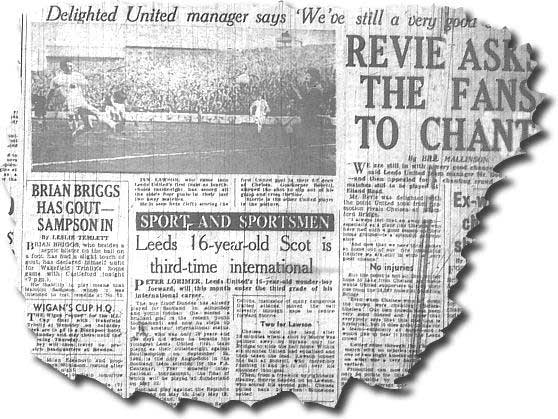 Reaney's
header on with the defence trying to play the offside trap.
Reaney's
header on with the defence trying to play the offside trap.
The gangly Lawson had scored both goals against Scunthorpe the week before
and was obviously keen to impress in his increasingly rare appearances
- he now had four goals from his four appearances in 1962-63. In September
he had asked for a transfer following the arrival of Charles and Storrie,
but his recall to the side and improved form now persuaded him to withdraw
his request for a move.
Chelsea refused to panic at falling behind and equalised before half
time when Blunstone powered a shot home from the edge of the box.
back to top
After the excitement of the first half, the rest of the match was a battle
of attrition, with neither side willing to give any ground and there were
no more goals. Leeds United had been fortunate with both their goals and
had been outplayed, but manager Revie claimed afterwards, 'We are still
in with a very good chance of promotion. I always feel that an away draw
- especially at a place like Chelsea who have had such a good season on
their home ground - is a splendid performance. And now that we have three
matches at home out of our five remaining fixtures we are still in with
a very good chance.'
That same night Sunderland drew at Southampton, while a day later Newcastle
beat leaders Stoke City 5-2, to keep things extremely tight. When Stoke
lost 3-2 at home to Scunthorpe the following weekend as Chelsea took a
day off, the challenges of Sunderland and Leeds gathered momentum. Sunderland
hammered Southampton 4-0 while two Jim Storrie efforts (one in the last
minute) and one from Don Weston gave Leeds a flattering 3-0 win at home
to Luton Town.
Bobby Collins, according to Eric Stanger a 'presiding genius', was the
architect of all United's best football, controlling the play against
Luton. Stanger: 'Collins helped in Storrie's first goal with a delightful
flick inside the back and he also helped to make the second for the dashing
Weston early in the second half. It was his centre which Baynham dropped
as he was hampered by one of his own defenders. Collins' greatest value
to Leeds, though, was his steadying influence when some of his younger
colleagues in their enthusiasm were apt either to try to play at too fast
a pace or get themselves out of position. A foot on the ball by Collins
to slow down play helped to calm taut nerves and give the others time
to sort themselves out.'
| |
Top of Second Division - 4 May 1963 |
| |
Pos
|
|
P
|
Pts
|
| |
1st
|
Stoke
City |
38
|
49
|
| |
2nd
|
Chelsea |
39
|
48
|
| |
3rd
|
Sunderland |
39
|
48
|
| |
4th
|
Leeds
United |
38
|
46
|
| |
5th
|
Newcastle
United |
40
|
46
|
| |
6th
|
Huddersfield
Town |
38
|
44
|
| |
7th
|
Bury |
38
|
44
|
Leeds were very much the form team, having dropped just three points
in eight games. They looked to be on the verge of a remarkable promotion
success, with their rivals clearly showing their nerves. However, despite
battling performances and phenomenal effort, United's season collapsed
as their luck deserted them.
Sprake blundered twice in the first half at Middlesbrough to gift the
Teessiders a 2-0 lead and even a fierce second half fightback could achieve
nothing more than a consolation goal.
Chairman and manager knew that the setback was a serious one, but sought
to emphasise the positive. Harry Reynolds: 'The players could not have
given one ounce more. We made mistakes, yes, but who doesn't in the course
of the season? I have no blame, nothing but praise for a magnificent fight
away from home. Nor are we finished yet, or anything like it. All our
ambitions are as high as ever.'
Don Revie: 'The lads were absolutely done when they came in from a match
which made me prouder than ever of them. They had made one of the finest
efforts this season, and if the result went against us, well, isn't that
football?'
The effort of having to catch up on their fixture backlog was finally
telling on the young side. The matches at home to Huddersfield on 11 May
and at Southampton four days later were the side's 17th and 18th matches
in 75 days since returning to action after the Big Freeze - and were clearly
a step too far.
Leeds lost both games and never looked in touch as their promotion dream
disintegrated. It was a disappointing end to a tremendously promising
season. However, when the final match brought a rousing 5-0 victory at
home to Swansea (guaranteeing a fifth place finish), it recalled the heady
days of the win away to the Welsh side in September when Revie's teenagers
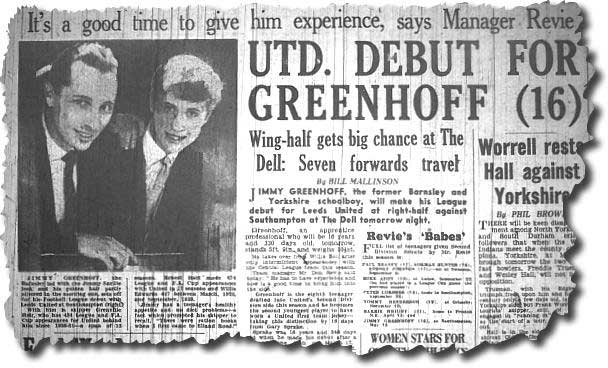 announced
their arrival. The manager chose to use the last couple of games to blood
another young hopeful, 16-year-old wing half Jimmy
Greenhoff, who thus became the second youngest player to appear in
the first team, and the eighth teenager to feature in an extraordinary
season.
announced
their arrival. The manager chose to use the last couple of games to blood
another young hopeful, 16-year-old wing half Jimmy
Greenhoff, who thus became the second youngest player to appear in
the first team, and the eighth teenager to feature in an extraordinary
season.
The gamble with John Charles had been a disastrous failure, but Don Revie's
experiments with youth were far more rewarding. The kids had paid off
in a way even the optimists could not have hoped, and the manager had
every reason to congratulate himself, ending the season by formally confirming
his retirement as a player when he announced his retained list. Billy
Bremner and Willie Bell remained on
the transfer list, along with Irish international Noel Peyton and reserve
defender Tom Hallett, but the squad sparkled with youthful talent, giving
more cause for optimism at Elland Road than for many a long year.
Of the 28 players on the retained list, 12 (Mick Bates, Terry Cooper,
Greenhoff, Henderson, Terry Hibbitt,
Hunter, Johnson, Paul Madeley, Reaney, Bobby
Sibbald, Sprake and Barrie Wright)
were teenagers, while 8 more (Addy, Bell, Bremner, John Hawksby, Johanneson,
Ian Lawson, Storrie and Brian Williamson) were 25 or under. Peter Lorimer,
David Harvey and Eddie Gray had arrived at the club but were still too
young to sign professional forms.
Led by the phenomenal Bobby Collins, enjoying the most glorious of Indian
summers, the exciting new United outfit looked as good as anything around,
brimming over with confidence and exciting young talent. Eric Stanger
had enthused about the team in his columns in the Yorkshire Post:
'Their football at times, imaginative, fast and crowned by hard shooting
was better than much that has been seen even in the First Division this
season. Leeds are blending in a harmony of purpose which comes from every
player being prepared to put team needs before personal achievement.'
A revolution was firmly under way, the like of which has rarely been
repeated in British football.
Part 1 - Return of the king
Other Football Highlights from 1962/63
- Ipswich manager Alf Ramsey was appointed to replace Walter Winterbottom
as England manager. After a successful summer tour, Ramsey declared,
'England will win the World Cup in 1966. We have the ability, strength,
character and players with the right temperament'
- The big winter freeze that gripped the country played havoc with football
for months and forced the season to be extended by several weeks
- Stanley Matthews chose the perfect moment to score his first goal
of the season for Stoke. They were leading 1-0 at home to Luton in their
last match of the season, and Matthews' goal made sure of victory and
the Second Division championship
- Tottenham continued to pile up the trophies, beating Atletico Madrid
5-1 to win the European Cup Winners' Cup. They thus become the first
British side to win a European trophy
- Despite the weather, Everton cruised to their first league title since
the war. Manager Harry Catterick had spent £175,000 on five players
in 1961/62 and their strength in depth enabled them to see off the challenge
of Tottenham, Burnley and Leicester with games to spare
- Manchester United were still in a transitional stage after the Munich
air disaster in 1958, so had to buy players to keep the team afloat.
Manager Matt Busby bought Denis Law back from Italy for £115,000 at
the start of the season and added Pat Crerand from Celtic. United struggled
all season in the league and it was only in their final match away to
neighbours City that they ensured their safety. Law won a penalty against
his old club in a 1-1 draw which meant that City, rather than United,
were relegated
- United were in better form in the Cup, however, beating Leicester
3-1 in the final with one goal from Law and two from David Herd. It
was United's first trophy since 1958
- Billy Wright, the former England captain, was appointed Arsenal manager
back to top












 ruled out for offside, but when right-half Eric Smith crashed into a tackle
on Moore he came off worst and had to be stretchered off with a broken
leg. It was a bad injury and Smith only ever played once more for United
before his transfer to Morton in June 1964.
ruled out for offside, but when right-half Eric Smith crashed into a tackle
on Moore he came off worst and had to be stretchered off with a broken
leg. It was a bad injury and Smith only ever played once more for United
before his transfer to Morton in June 1964. down
to the club as well. We put them up in hotels and let them stay a short
time. We took them to see the people who looked after the boys in digs.
We even had a church minister come down to the ground every Thursday to
walk round the dressing room and ask the young players if they had any
problems.'
down
to the club as well. We put them up in hotels and let them stay a short
time. We took them to see the people who looked after the boys in digs.
We even had a church minister come down to the ground every Thursday to
walk round the dressing room and ask the young players if they had any
problems.'
 by
far the worst FA Cup record in the country and had not won a tie since
February 1952, when goals by Jim Milburn and Ray Iggleden had seen off
Bradford 2-1 in the fourth round.
by
far the worst FA Cup record in the country and had not won a tie since
February 1952, when goals by Jim Milburn and Ray Iggleden had seen off
Bradford 2-1 in the fourth round. launched
the most unlikely of promotion bids.
launched
the most unlikely of promotion bids. Reaney's
header on with the defence trying to play the offside trap.
Reaney's
header on with the defence trying to play the offside trap. announced
their arrival. The manager chose to use the last couple of games to blood
another young hopeful, 16-year-old wing half Jimmy
Greenhoff, who thus became the second youngest player to appear in
the first team, and the eighth teenager to feature in an extraordinary
season.
announced
their arrival. The manager chose to use the last couple of games to blood
another young hopeful, 16-year-old wing half Jimmy
Greenhoff, who thus became the second youngest player to appear in
the first team, and the eighth teenager to feature in an extraordinary
season.